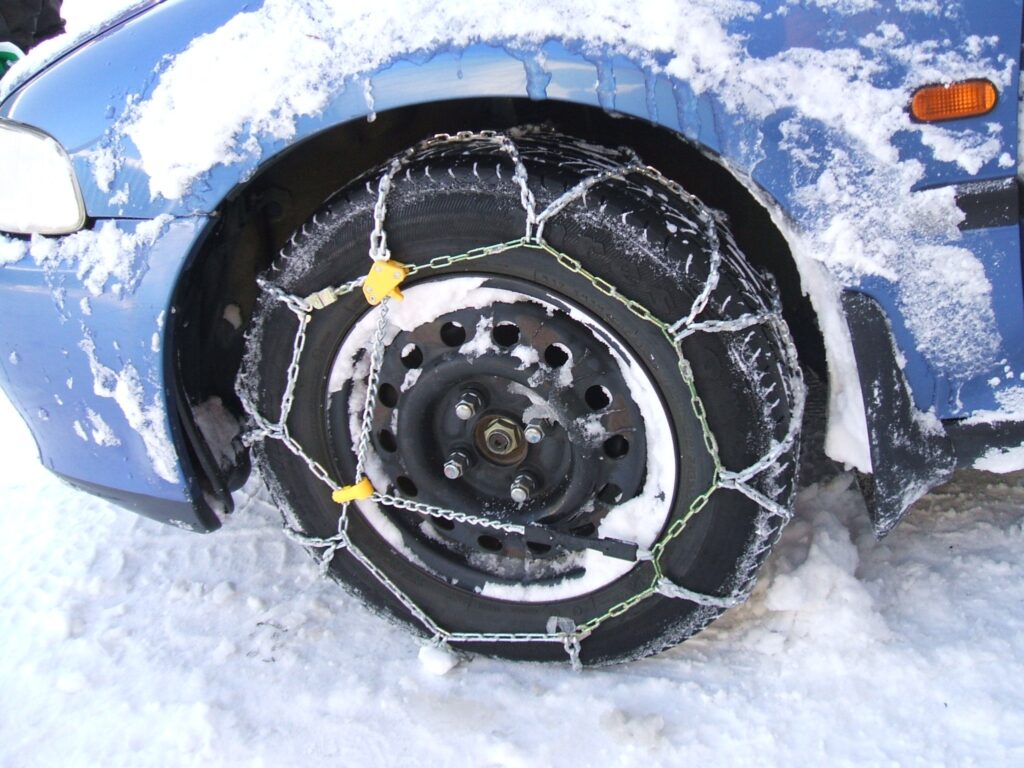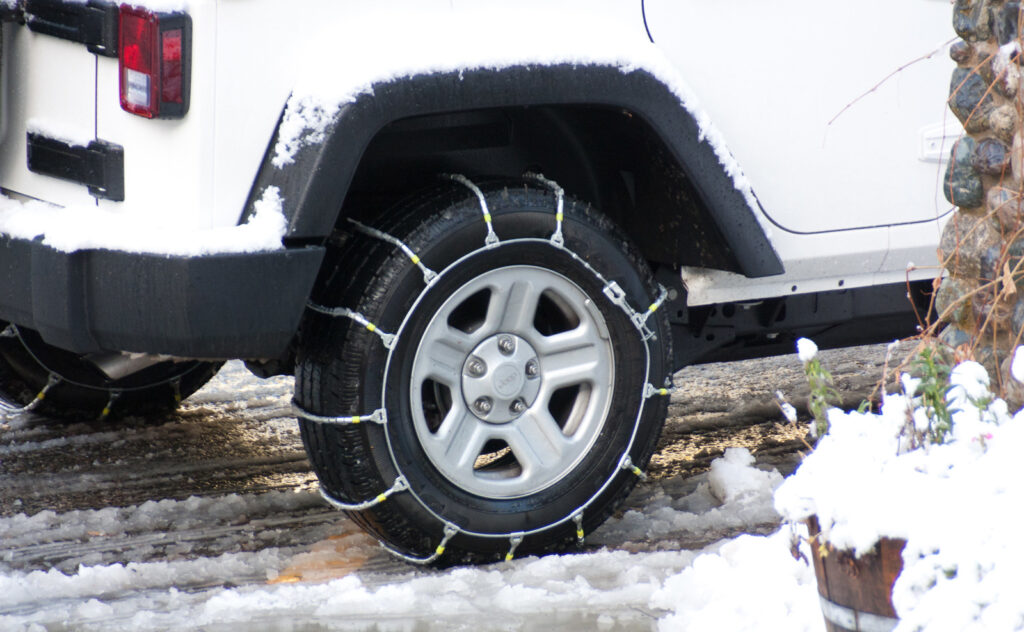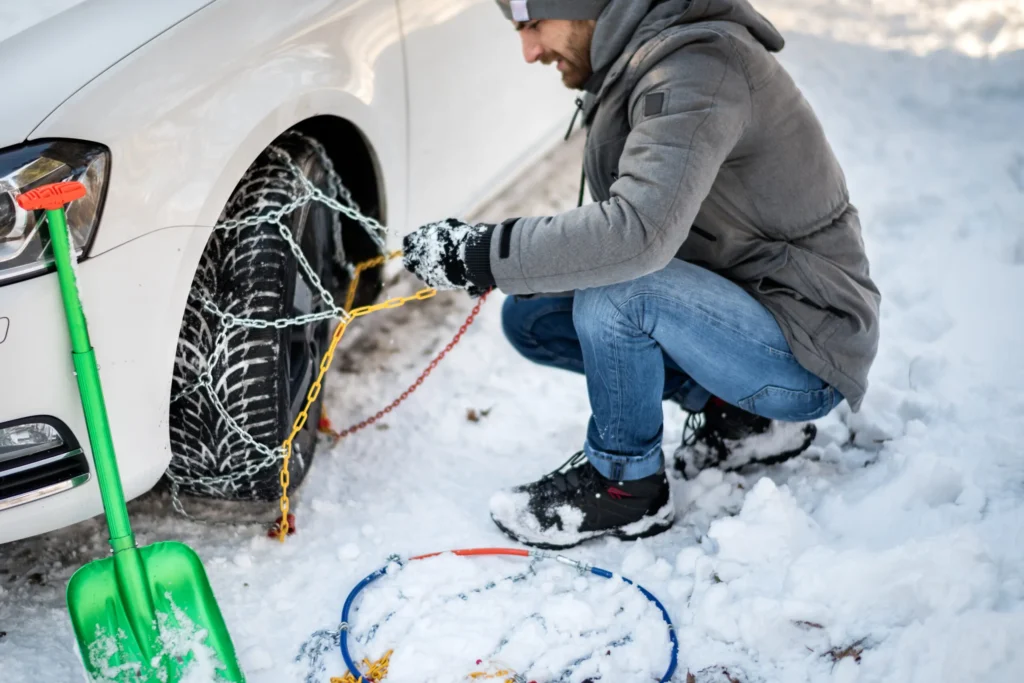Jeeps are known for their ability to handle tough terrains and challenging weather conditions. However, even a Jeep can face difficulties driving on icy or snowy roads during winter.
Jeeps generally don’t need snow chains if they have 4WD and winter tyres. Chains may be required in areas without 4WD or winter tyres. Install chains only on the rear tyres and drive at slow speeds if needed.
This guide explores when and why snow chains are needed, how to use them properly, and what alternatives exist for driving your Jeep safely in winter weather.
Understanding Snow Chains and Their Purpose
1. What Are Snow Chains?
Snow chains are metal devices that fit over your tyres. They’re designed to give extra traction when driving on snow or ice, helping your car stay steady and avoid sliding.
2. How Snow Chains Improve Traction
Snow chains dig into snow and ice, giving your tyres a firm grip. This added traction makes it easier to brake, turn, or climb hills safely, even in tough winter conditions.
3. The Science Behind Snow Chains

Snow chains increase surface friction between tyres and icy roads. By creating small edges and grooves, they break through slippery layers, making it harder for your car to skid or lose control.
4. Situations Where Snow Chains Are Most Effective
Snow chains are best used on icy roads, snowy mountain passes, or steep hills. They’re ideal when roads are covered in deep snow, giving you the confidence to drive safely in extreme winter conditions.
Jeep Capabilities in Winter Conditions
1. Why Jeeps Are Built for Tough Terrains
Jeeps are designed to tackle tough terrains with their rugged construction, high ground clearance, and powerful engines. They’re made for challenging conditions like snow, mud, or rocky paths, offering drivers strength and reliability.
2. Features Like Four-Wheel Drive (4WD)
Jeep’s 4WD system helps distribute power evenly to all wheels. This improves grip and control on slippery or uneven surfaces, making driving safer without getting stuck in snowy or icy conditions.
3. Off-Road Tires and Their Grip
Jeeps often come with off-road tyres that have deep treads for better traction. These tyres grip snowy and icy roads more effectively, giving you stability and reducing the chances of skidding.
4. Limitations of Jeeps Without Snow Chains
Even with 4WD and good tyres, Jeeps can struggle in extreme winter without snow chains. Snow chains add extra grip, ensuring safety on icy roads or in deep snow where tyres alone might not be enough.
Factors to Consider for Snow Chains on Jeeps
1. Local Weather Conditions
Snow chains are a smart choice if you often drive in heavy snow or icy areas. They provide the grip needed for harsh winter weather, especially in mountainous or frequently snowy regions.
2. Road Rules and Regulations Regarding Snow Chains
Some places require snow chains during winter, especially in mountain areas. Check local laws to avoid fines and ensure you’re driving safely in conditions where chains might be mandatory.
3. Jeep Model and Tire Type
Different Jeeps and tyres need specific snow chains. Ensure the chains you choose fit your tyre size and work well with your Jeep model to avoid damage or performance issues.
Benefits of Using Snow Chains on Jeeps

1. Enhanced Traction and Stability
Snow chains give your Jeep’s tyres extra grip, helping them hold firmly to slippery snow or ice. This improves stability and reduces the risk of skidding, keeping you and your passengers safer.
2. Improved Control on Icy Roads
Driving on icy roads can be tricky, but snow chains make it easier to steer and brake. They help you maintain better control of your Jeep, even in extreme winter conditions.
3. Legal Compliance in Certain Regions
In some regions, snow chains are required during winter to ensure safety. Using snow chains on your Jeep helps you stay within the law while improving your safety on snowy or icy roads.
Challenges and Downsides of Snow Chains
1. Reduced Speed and Convenience
With snow chains, your speed must be reduced to stay safe. Driving too fast can damage the chains or tyres. Installing and removing chains can also be time-consuming, especially in freezing temperatures.
2. Possible Damage to Tires and Roads
While snow chains improve traction, they can also cause tyre wear or damage. They may also harm road surfaces, especially if used on clear or dry roads, where the metal links can scratch and wear the pavement.
Alternatives to Snow Chains for Jeeps
1. Snow Tires vs. Snow Chains
Snow Tires
- Designed for winter conditions with special tread patterns.
- Provide consistent traction on snow and ice.
- It can be used all winter without needing removal.
- More comfortable for everyday driving.
- It is less effective in very deep snow or extreme ice.
Snow Chains
- Provide extra traction in deep snow or ice.
- It must be installed and removed when needed.
- Effective in extreme winter conditions, like steep hills.
- It can damage tyres and roads if used incorrectly.
- Not suitable for long-term use on dry roads.
2. Tire Socks and Other Traction Devices
Tire socks are an alternative to snow chains. They fit over tyres and provide extra grip on snow and ice. They’re easier to install and remove but may be less effective in deep snow or extreme ice.
Tips for Installing and Using Snow Chains

1. Selecting the Right Chains for Your Jeep
Choose snow chains that fit your Jeep’s tyre size and model. Check your owner’s manual for specific chain recommendations. The right fit ensures better traction and helps avoid damage to your tyres or vehicle.
2. Proper Installation Techniques
Before installing:
- Lay the chains flat and check for any twists.
- Install them over the tyres, tightening them securely.
- Follow the instructions carefully to ensure they’re snug and properly positioned to provide the best grip.
3. Step-by-Step Guide
- Lay the chains flat beside your tyres.
- Place them over the top of the tyre.
- Tighten the chains, making sure they’re secure.
- Drive slowly to check if they’re working properly.
- Recheck after a short drive and adjust if needed.
4. Safety Precautions While Driving with Chains
Drive slower than usual, especially on dry roads, to avoid damaging the chains. Avoid sharp turns and sudden stops. Always follow the speed limits for driving with chains to ensure your safety and the longevity of the chains.
Maintenance and Care for Snow Chains
1. Cleaning and Storing Snow Chains
Wash off any dirt, ice, or salt after use. Dry them completely before storing them in a dry, cool place, like a bag or box, to prevent rust. This will keep your chains ready for use the next time.
2. Inspecting Chains for Wear and Tear
Before each use, check your snow chains for any signs of damage, like broken links or fraying. Regularly inspect them throughout winter to ensure they are still in good condition and will provide proper traction.
Do jeeps need snow chains 2021
While many Jeeps are designed for tough conditions, snow chains can still be helpful in extreme winter weather. In 2021, snow chains are recommended for driving in deep snow, icy roads, or steep hills, ensuring better traction and safety.
Best snow chains for Jeep Wrangler
For a Jeep Wrangler, choose snow chains that fit your tyre size and are designed for off-road use. Options like the Security Chain Company Z-Chain or Thule CG-9 offer durability, easy installation, and great traction in snow and ice.
FAQs
1. Are jeeps OK in snow?
Yes, Jeeps are built to handle snow and rough terrains. They can handle snowy roads with 4WD and good tyres, but snow chains may be needed in deep snow or ice.
2. Do 4×4 need snow chains?
4×4 vehicles, like Jeeps, perform well in snow but may still need snow chains in extreme conditions. Chains help improve traction on icy or very deep snow.
3. Do jeeps have timing belts or chains?
Most Jeeps use timing chains instead of belts. Timing chains are more durable and typically last longer, requiring less maintenance than timing belts.
4. Do you need winter tyres for Jeep?
Winter tyres are highly recommended for Jeeps in snowy or icy conditions. They provide better traction and safety than regular tyres when driving in cold weather.
5. How to drive a Jeep in snow?
Drive slowly and smoothly to maintain control. Use 4WD for better traction, and avoid sudden stops or sharp turns. Always stay aware of road conditions when driving in snow.
6. Does a 4×4 need winter tires?
While 4×4 vehicles like Jeeps handle snow well, winter tyres are still recommended for better traction. They improve grip and safety in icy or snowy conditions.
7. What is snow mode in a Jeep?
Snow mode is a driving setting that adjusts your Jeep’s power and traction for snowy or slippery roads. It helps maintain control in winter conditions.
8. Are Jeeps rough to drive?
Jeeps can feel rough due to their off-road design, especially on smooth roads. However, they’re built for durability and handling tough terrains.
9. Are Jeeps always 4WD?
Not all Jeeps are 4WD, but most models, especially Wranglers, come with 4WD. Some models have 2WD options for better fuel efficiency.
10. Do Jeeps have high maintenance?
Jeeps may require more maintenance than regular cars, especially if used off-road. Regular checks and care to keep them running smoothly and help prevent costly repairs.
Conclusion
In conclusion, while Jeeps are built to handle tough winter conditions, snow chains can still provide extra safety on icy or snowy roads. Check your local regulations and install snow chains when needed to ensure a safe, smooth drive.






0 Comments